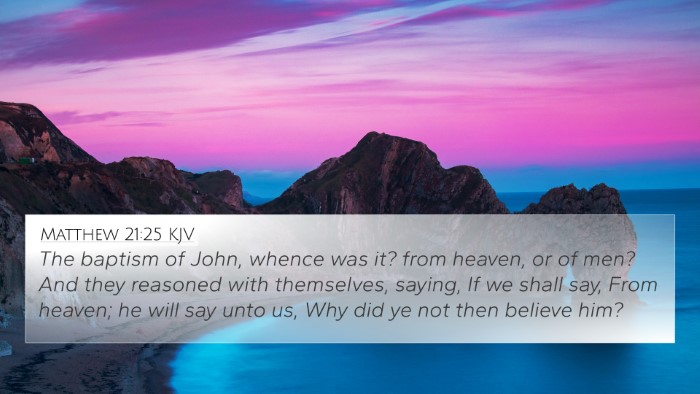Understanding Luke 20:4
Luke 20:4 (KJV): “The baptism of John, was it from heaven, or of men?”
Summary of Meaning
In this verse, Jesus poses a critical question to the religious leaders regarding John the Baptist's authority and the divine origin of his baptism. This inquiry serves to challenge their understanding and position, drawing attention to the need for reflection on spiritual truths.
Contextual Insights
Jesus’s question about John’s baptism is pivotal in his dialogue with the Jewish authorities. This moment illustrates how Jesus used questions to provoke thought and self-examination among his interlocutors, particularly those in religious power.
Key Themes
- Divine Authority: The query emphasizes the importance of recognizing and acknowledging divine authority.
- Authenticity of Ministry: Jesus implicitly underscores the validity and origin of public ministry, distinguishing between human and divine commissions.
- Faith and Doubt: The question invites reflection on personal beliefs and the risks of doubt toward divinely ordained missions.
Cross-References to Explore
Luke 20:4 relates closely to several other biblical themes and verses:
- Matthew 21:25: Discusses the same issue of John's baptism and its origins.
- Acts 19:3-4: Highlights the importance of understanding baptism and teaching in the early church.
- John 1:32-34: John the Baptist affirms his testimony about Jesus, revealing his divinely appointed mission.
- Mark 11:30: A parallel account of the religious leaders questioned about John's authority.
- Luke 7:29-30: Speaks to the rejection of God’s purpose by the Pharisees and lawyers concerning John.
- John 3:27: John speaks about receiving heaven's testimony, aligning with the question's notion of divine authority.
- Isaiah 40:3: A prophetic reference that underscores John's mission as the forerunner of Jesus.
- Matthew 3:11: John's baptism of repentance and the significance of his role in preparing the way for Jesus.
- Luke 3:3: Discusses the context of John's ministry, emphasizing the call to repentance.
- Hebrews 5:4: The notion that no one takes this honor upon themselves, implying divine appointment is necessary.
Commentary Insights
Matthew Henry:
Henry emphasizes the importance of the question posed by Jesus. He notes that this inquiry not only tests the faith of the Jewish leaders but also calls for a public acknowledgment of who John was—a prophet sent by God.
Albert Barnes:
Barnes remarks on the strategic nature of Jesus's question, which places the leaders in a dilemma. He suggests that the answer to the question would reveal their unwillingness to accept the truth about John’s authentic ministry and its implications for Jesus.
Adam Clarke:
Clarke elaborates on the implications of John's baptism for salvation and repentance, enhancing the understanding of the necessity for divine endorsement of ministry. He also highlights the spiritual urgency behind Jesus’s probing question.
Thematic Connections
Luke 20:4 invites an examination of themes such as:
- Authority in ministry and the question of legitimacy.
- The relationship between prophetic mission and divine truth.
- Challenges facing belief under scrutiny from authoritative figures.
Using Bible Cross-References
To deepen understanding of Luke 20:4, utilizing tools for cross-referencing is essential. Approaching scripture with a comparative Bible verse analysis helps uncover the broader narrative and thematic connections, revealing how different texts interact with each other.
How to Use Cross-References
Engaging in cross-referencing involves:
- Studying multiple verses together to identify patterns and contrasts.
- Utilizing a Bible concordance to find specific topics and their references.
- Employing thematic Bible verse connections to link passages that reveal similar ideas.
Conclusion
Luke 20:4 serves as a rich text for understanding both Jesus' method of teaching and the nature of divine authority. Through critical inquiry, believers are invited to reflect on their faith and understanding of God’s word.










